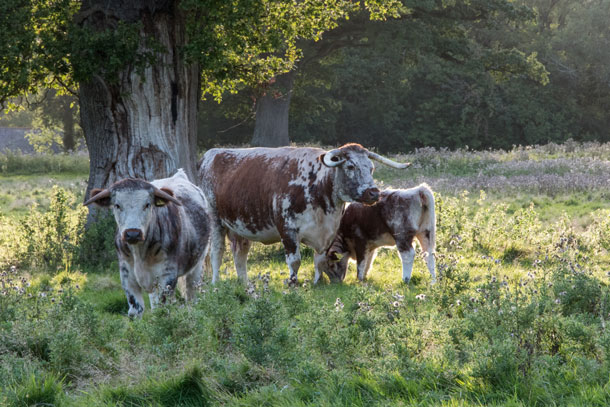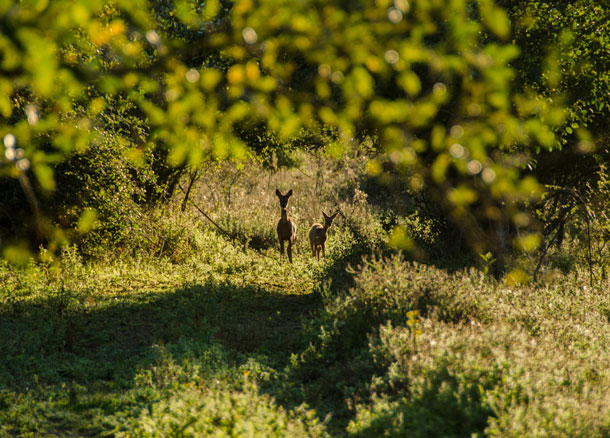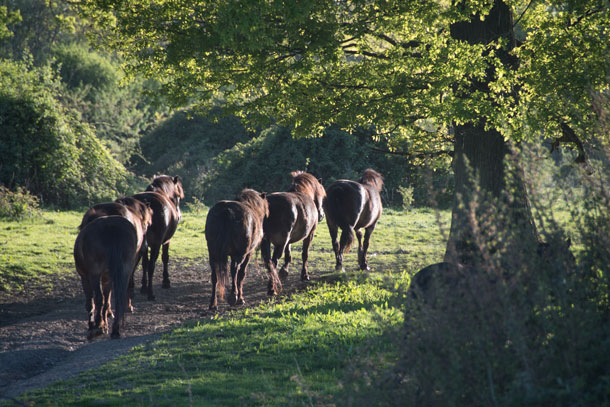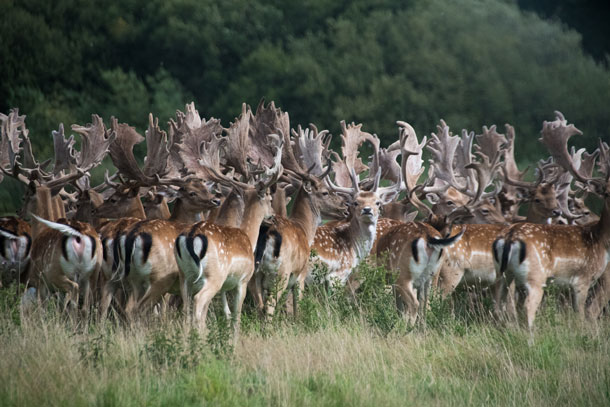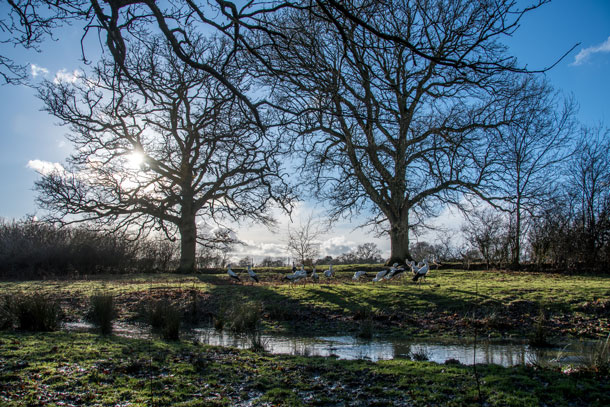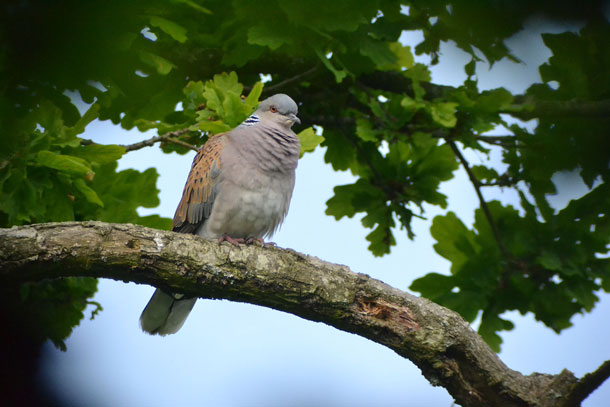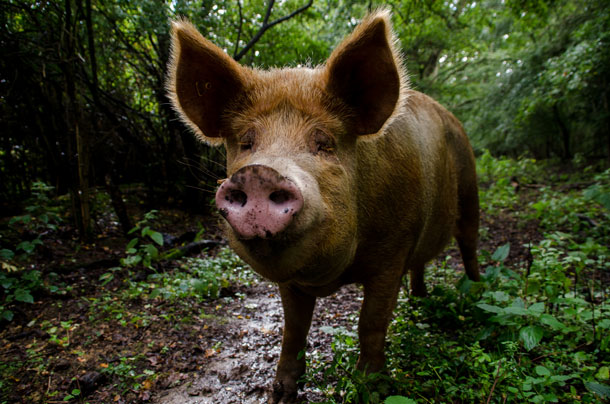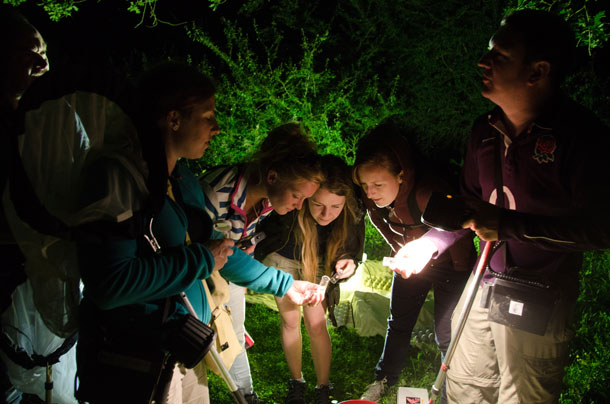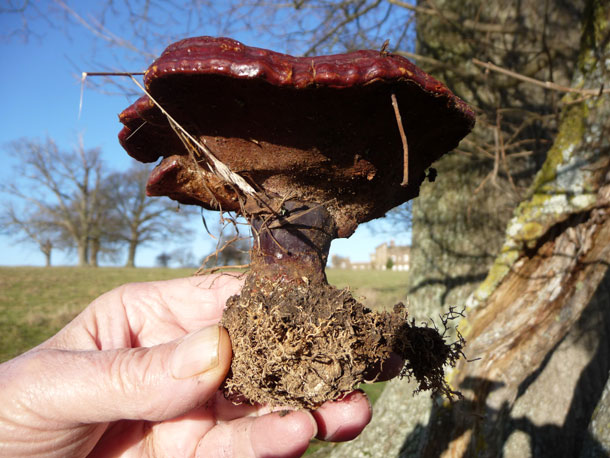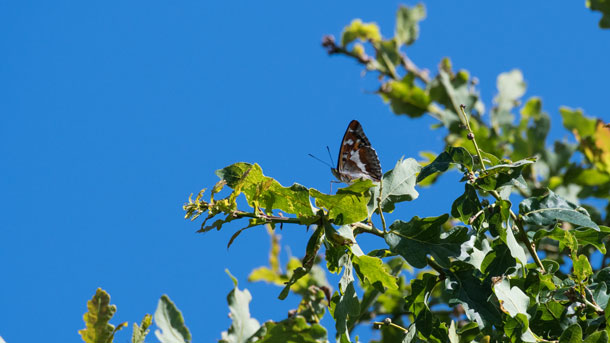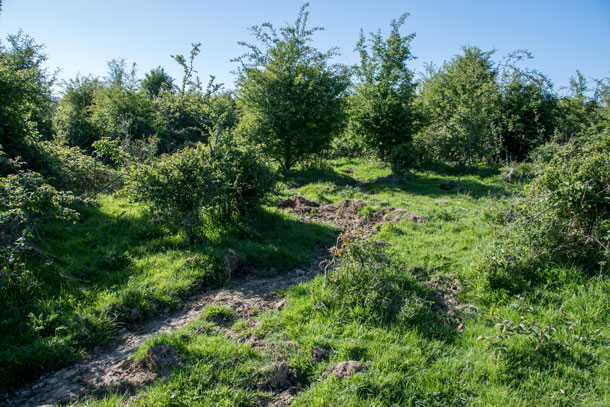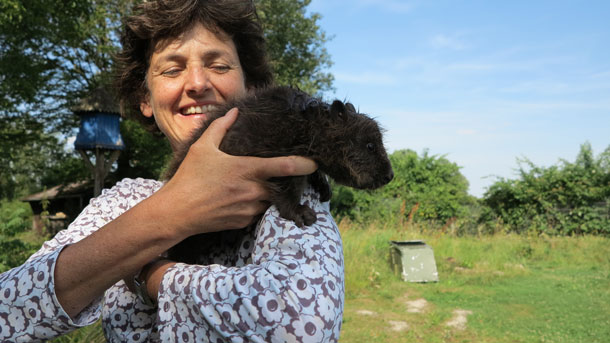Rewilding The English Countryside
Air Date: Week of August 16, 2019
When an agricultural estate in West Sussex, England that had been in one couple’s family for generations was no longer a fruitful venture, they decided to let nature take its course. Author Isabella Tree tells Living on Earth’s Bobby Bascomb about the ecological and financial benefits of letting nearly six square miles of previously cultivated landscape go back to nature. Her estate today brings income from game meat and ecotourism, and offers a glimpse into what rural England might have looked like before agriculture.
Transcript
BASCOMB: It’s Living on Earth, I’m Bobby Bascomb.
When writer Isabella Tree, and her husband, Charlie Burrell, inherited an estate in West Sussex, England, they assumed they would continue to farm as generations of family had before them. But the intensive agriculture of their predecessors grew increasingly difficult, and they decided that farming was no longer a viable option. So they began to mull over another idea: Give the land back to nature and let it take its course. Isabella Tree’s recent book is titled Wilding, and it’s the story of what happened to the land when they gave up farming and let nature take the reins. Isabella joins us now. Welcome to Living on Earth!
TREE: Thank you. Lovely to be here.
BASCOMB: Thank you. So tell me briefly about your property and how it's traditionally been used. What did it look like before you started this re-wild project?
TREE: Well, I mean, we inherited this piece of land from my husband's grandparents. So, we inherited in about the 1980s. And it had been intensively farmed for ever since pretty much the second World War. So, when we took over it was a patchwork of very small fields with hedges and it was intensive, arable, and dairy farming. And we just simply assumed that's what we would continue to do for the rest of our lives, is carry on the family tradition and farm. But already when we took it over the farm was losing money hand over fist. So, we kept buying, you know, bigger machines, throwing more pesticide, more fertilizer, more nitrates, built bigger dairies and changed our types of cows to more higher-milk-yielding cows. So, it really did look pretty much like an intensive farm. And nature really wasn't part of that picture.
BASCOMB: Mmhmm. So what was your inspiration then, to take on a project like this. I mean, you could have just sold the property or leased it to someone else to farm.
TREE: Well, in a sense, we did lease it to someone else to farm because we tried contract farming. So, we sold all our farm equipment. It was a very, very black day. For us, we are part of a kind of long tradition of the family owning this land. Charlie's ancestors have been here since the Nash castle was built two hundred and twenty or so years ago. It really isn't for us an option to sell. We feel we're kind of stewards of this land, and we can't just sell up and move out. So, to look forward to the future, we really had to think of something else, to do something kind of with the land rather than against it.
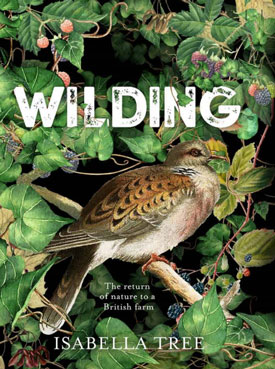
Isabella Tree is the author of Wilding, a book which documents the process she and her husband undertook to rewild their English estate. (Photo: Courtesy of Isabella Tree)
So, we tried contract farming for a little while. That is somebody else farming our land for us, trying to cut our overheads. But even then it proved unprofitable. We're on very, very heavy clay. That's the bane of our lives and I think the Inuit are supposed to have dozens of words for snow, at least that's how the myth goes. But in West Sussex, we have in old Sussex dialect over 30 different words for mud. And so, that made us very uncompetitive to farming. So, even our contract farmer was very willing to give up when we found an alternative, which was going back to nature.
BASCOMB: Well, how did you even come up with that alternative? I mean, for most farmers, I think it's probably pretty counterintuitive to just let the land go. I mean, that's not what you do as a farmer.
TREE: It is a very, very difficult thing to do, you're absolutely right. Going from intensive management, where you're really manipulating everything and tidying up and managing the land to the nth degree, to just sitting back and letting go is a massive mind swing.
BASCOMB: You talk a lot in your book about the importance of introducing herbivores. What animals did you introduce and why?
TREE: Well, we introduced... we had to introduce animals that we knew would be able to survive outside all year round without supplementary feeding, that would be able to fend for themselves even in a harsh or wet winter. So, we chose old breeds, we chose Old English Longhorn, wonderful cows with great white finching stripe down their backs and great big horns. And then Exmoor ponies, one of our oldest breeds of horse, they are fantastic at surviving, out in any landscape. Very, very hardy, indeed. And Tamworth pigs, another old breed that's very closely related to Iberian swine. So, they're the closest we felt that we could get with an English variety of pig to the wild boar. And then we had roe deer here already in low numbers. And then we introduced fallow deer and red deer.
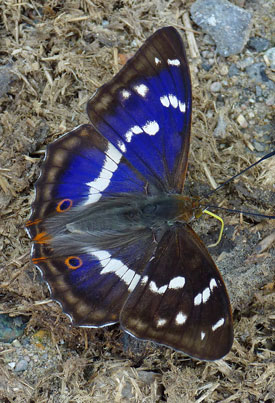
A male purple emperor butterfly – one of the hundreds of insect species that have been discovered in the rich, biodiverse Knepp ecosystem. (Photo: Charlie Burrell / Knepp Estate Castle)
BASCOMB: So, tell me about your property today. What does it look like? What does it smell like, even sound like, and how is that different from what you started with?
TREE: Oh, I mean, the first thing you notice, I think, when you walk around Knepp today is the sound of insects, for a start. On a day like this, it's a hot, sunny day, you've just got the sound of crickets and grasshoppers, you've got bees, you've got hover flies, you've got every sort of insect out there. It's thick with insects. If you go out there on a bicycle, you have to wear sunglasses or, you know, because you're getting insects in your eyes.
I mean, you know, we've forgotten that this used to be the norm 50 years ago. But in the era of pesticides, we just don't see insects anymore. So the sound of insects is astonishing. And then, of course you've got the bird song, surround sound bird song. Go out into the thickets, it's sort of like the African scrub. It's thorny scrub, its a patchwork of water meadows running into open grazed areas that the animals have a preference for gracing. You've got mature oak trees; again, a haven for insects and birds. It's a wonderful thing to be sitting in the middle of. But it's a double edged sword because we now go on walks in other places in the UK, places where we always used to enjoy, you know, an hour or two to walk, and now we notice what isn't there. And it's that, it’s what Aldo Leopold called that sadness, that tragedy of having an ecological education. You know what isn't there and what could be there, what should be there.
BASCOMB: So, which species came back on their own, or what were you most excited or surprised to see on your land?
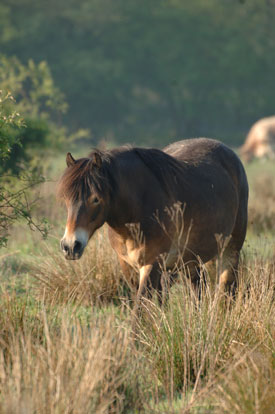
Exmoor ponies seem to be thriving, despite concerns that the clay in that part of England would be too soft for them. (Photo: Charlie Burrell / Knepp Estate Castle)
TREE: So, this is the thing. We literally haven't introduced anything apart from the free-roaming animals. So, they've all found us on their own. You know, we have 13 out of the 18 breeding species of bat in the UK. One of them called the Bechstein's bat is so rare, it's rare even in Europe, and we don't know much about it, it's that rare, but we have it at Knepp. We have Peregrine Falcons, we have them nesting in a tree. Usually you associate Peregrine falcons with cliffs and clifftops. They nest in steeples and cathedrals, but not in a tree. Nightingales are another species that is associated with woodland, but at Knepp they're taking up territories our exploding hedgerows and our thorny scrub. And so they're choosing a very different habitat because it's suddenly available to them. So, it's really changing the science books, we’ve forgotten that this is where nightingales love to be. And I think that's one of the lessons from Knepp, is that we're so used to seeing species in a very, very depleted landscape, that that's where we think they want to be. But in fact, they're often clinging on by their fingernails to habitat that just isn't optimal for them. And where they'd much rather be is in the kind of habitat that we're presenting for them at Knepp.
BASCOMB: But you had to stop short of actually creating a really native self sustaining ecosystem. You couldn't introduce predators there.
TREE: No, and we can't, we're obviously very constrained by where we are in the southeast of England and very busy area of the most densely populated part of Britain. We're underneath the Gatwick stacking system, where we have planes flying over us. We have roads all around us, we're in the middle of a very managed landscape. We certainly can't have predators where we are at Knepp, on three-and-a-half thousand acres, it's just tiny. It's nothing. Even a lynx requires a vast territory to survive. So, all we're trying to do really is to use tools that are available to us now in the environment in which we find ourselves, which is hugely transformed already by human impact. So, we're not trying to recreate the past in any way. We're just trying use a bit of inspiration from the past. And recognizing that herbivores in a landscape can trigger these extraordinary natural processes, the way they trample and rootle, the way they rip branches. The red deer will debark trees. So, you’re really letting them manage the landscape for you.
The only intervention we do is we cull them. So, we keep the numbers very low, because in the absence of predators, and also because we don't want to allow them to starve, which is what would happen in a huge system like Yellowstone or Serengeti. And in the process we, that provides us with a really useful income stream. So, we now produce 70 tons of meat a year, that's wonderful, sustainable, ethical, pasture-fed organic Longhorn beef and venison and pork. But because there are so few inputs, there's no agricultural buildings involved, there's no supplementary feeding, we're actually making way bigger profits – we’re actually making profits! Whereas before when we were farming, we rarely made a profit.
BASCOMB: How did your neighbors react when you said, you know what, we're just going to stop farming and let nature take its course.
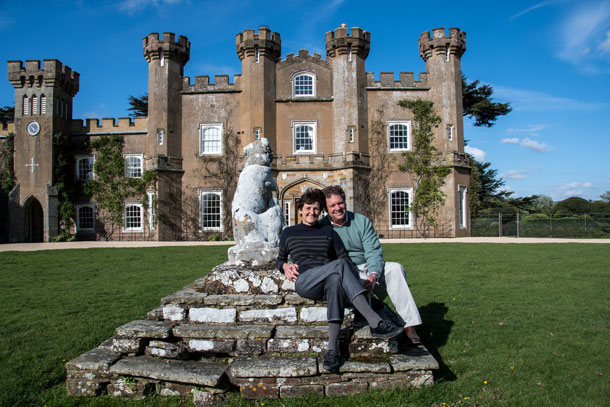
Isabella Tree and husband Charlie Burrell in front of their Knepp Castle Estate. (Photo: Charlie Burrell / Knepp Estate Castle)
TREE: It was very interesting. We held a meeting where we told them what we were going to do, and we invited them to join us and take part in this scheme and take advantage of the subsidies, the European subsidies, the higher level stewardship, agri-environment subsidies that were available to us. This we thought was a very positive message to be giving them, that you know, with, with farming going through the doldrums and especially on our soils, we really were facing a very, very uncertain future. And they are too, they still are, particularly post-Brexit. So, we assumed that we'd have a lot of people throwing their hats into the ring, but that wasn't the case at all. And I think if your family has been doing it for generations and generations, and if it's instilled in you and your kind of, your cultural ethos is that every inch of the land should be producing food -- which is a mentality we still have leftover from World War II even though now we know we are producing enough food to feed the planet and more -- if you feel every inch of the land needs to be managed and controlled, it's very difficult to embrace something that is messy and unpredictable. But interestingly, over the last few years, we’ve found the tide is beginning to turn.
As I say, I think post-Brexit people are really worried about the future. They've also seen how extraordinary the successes have been at Knepp. And I think those successes, compounded by the fact that we're looking the loss of EU subsidies in the face, is making people rethink. And we have a lot of landowners, farmers, policymakers and conservationists now pouring into Knepp to look at what we're doing, and if they can replicate something on their land.
BASCOMB: So, what advice would you have for other farmers that maybe aren't ready to jump in with two feet, but want to do some re-wilding on their land?
TREE: Obviously, if you're on Grade One, beautiful, lovely, loamy soil, and very productive land, you won't want to move away from farming, you're already making profits, and you've already got a sustainable business. But I think we really need to look at the whole landscape, and the nationwide level, even where farming is very profitable, and your kind of bread basket, you know, your huge, great swathes of arable land. It's a shame to think that nature doesn't belong there, and I so I think even in those areas that are completely given over to food production, we ought to be looking at giving some space, some percentage of the land.
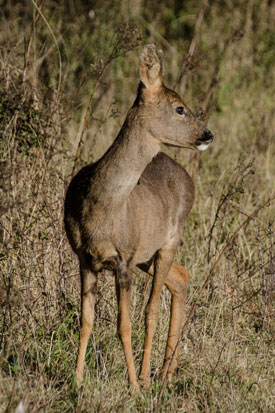
A Roe Deer. (Photo: Charlie Burrell / Knepp Estate Castle)
So, I think even if you're a small farmer, you can work in connection with neighbors to provide stepping stones or corridors, natural corridors to link other spaces for nature together. I think another thing, perhaps, is pop-up Knepps, this idea that you don't have to re-wild your land for forever, maybe you could just re-wild your land for, say, a generation, 25 or 30 years or so. And then once your soil is restored, once your water has been cleaned, you've had a period of sequestering carbon, you've provided habitat for insects and birds and other wildlife, then you can return it to sustainable agriculture. And that's very easy to do. You just, you know, put in these huge machines, these forestry machines that can take up all the thorny scrub and turn it back to a workable tilth in a matter of hours. But meanwhile, you've got areas around you that are beginning to re-wild, so they already have thorny scrub coming up. And that's where your turtle doves or where your nightingales will go when one area is returned to agriculture. So, you're really using it again on a rotational system, like the old farming system used to be where you let land lie fallow, but you're doing it on a much bigger scale over a much longer period of time.
BASCOMB: That is really interesting. It's a really, a really clever idea. It seems new, but as you said, a very old idea, really.
TREE: Yeah. And that way you can restore your soils. We're facing a crisis in the UK, as I think many places in the states are; in the UK, we have 100 harvests left before we have no topsoil in which to grow anything. I mean, it really is a terrifying thought. But re-wilding, we've seen from Knepp, can restore soil.
BASCOMB: Well, this sounds great, and so encouraging. But how do you actually make a living at it? I mean, I'm sure there are farmers here in the US that are struggling to make ends meet. It's a notoriously difficult business. But how do you still make money from your land? And how did you afford to take on such an elaborate project to begin with?
TREE: Well, I mean, that's exactly it. We were losing money hand over fist doing conventional farming. So, just giving up farming on this land, we cleared our overdraft, we cleared our debts. We've got this revenue, as I just described, coming in from our sort of organic, pasture-fed free-roaming animals. But we also have all these defunct agricultural buildings. And so with a bit of capital outlay, we can convert those into offices and storage space and space for light industrial use.
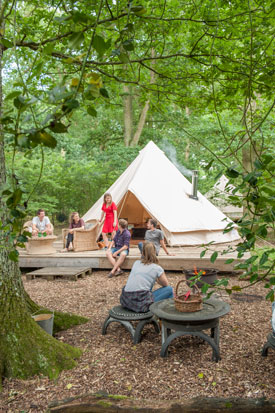
Knepp offers luxury campsites for rent on its grounds. Pictured – a group of “Glampers”. (Photo: Charlie Burrell / Knepp Estate Castle)
So, now that brings in considerable amount of rent. And then we've got our new eco-tourism business, that's been going for about five years now, because we've now got so much wildlife that you can come and see here, we thought, well, why not have safaris? You don't have to go to Africa to see exotic and exciting wildlife. And then we have glamping and camping, so a kind of African-style safari, luxury safari camp, and a pitch your own tent camp. And that ecotourism business now brings in 300,000 pounds a year, and we hope to be making about 20 percent profit on that.
BASCOMB: Well, what are your ambitions for the future of the estate? Where do you go from here?
TREE: Well, that is the wonderful thing about re-wilding, you never know. We would love to see beaver back at Knepp. We will be applying for a license to release beaver, and that is a new thing in England that we hope the government will support. They would be a fantastic contributor to some hydrological engineering that would produce wonderful results for biodiversity. Maybe one day we'll see bison arriving, we’ll see the English government accepting that bison could be back. Perhaps we'll even see wild boar breaking through our perimeter fence because we can't, by law, we can't release them, but they we know they're in the vicinity. So, if they arrive here, there'll be allowed to stay. It's just a question of hoping that our delightful Tamworth pigs will entice them in.
BASCOMB: [LAUGHS] Isabella Tree is an award winning author and travel writer. Isabella, thank you so much for sharing your story with me.
TREE: My pleasure. Great to talk to you.
[MUSIC: Claire Jones/Royal Harp Strings, “10 Woodland Sketches”]
Links
Living on Earth wants to hear from you!
Living on Earth
62 Calef Highway, Suite 212
Lee, NH 03861
Telephone: 617-287-4121
E-mail: comments@loe.org
Newsletter [Click here]
Donate to Living on Earth!
Living on Earth is an independent media program and relies entirely on contributions from listeners and institutions supporting public service. Please donate now to preserve an independent environmental voice.
NewsletterLiving on Earth offers a weekly delivery of the show's rundown to your mailbox. Sign up for our newsletter today!
 Sailors For The Sea: Be the change you want to sea.
Sailors For The Sea: Be the change you want to sea.
 The Grantham Foundation for the Protection of the Environment: Committed to protecting and improving the health of the global environment.
The Grantham Foundation for the Protection of the Environment: Committed to protecting and improving the health of the global environment.
 Contribute to Living on Earth and receive, as our gift to you, an archival print of one of Mark Seth Lender's extraordinary wildlife photographs. Follow the link to see Mark's current collection of photographs.
Contribute to Living on Earth and receive, as our gift to you, an archival print of one of Mark Seth Lender's extraordinary wildlife photographs. Follow the link to see Mark's current collection of photographs.
 Buy a signed copy of Mark Seth Lender's book Smeagull the Seagull & support Living on Earth
Buy a signed copy of Mark Seth Lender's book Smeagull the Seagull & support Living on Earth
When an agricultural estate in West Sussex, England that had been in one couple’s family for generations was no longer a fruitful venture, they decided to let nature take its course. Author Isabella Tree tells Living on Earth’s Bobby Bascomb about the ecological and financial benefits of letting nearly six square miles of previously cultivated landscape go back to nature. Her estate today brings income from game meat and ecotourism, and offers a glimpse into what rural England might have looked like before agriculture.
Transcript
BASCOMB: It’s Living on Earth, I’m Bobby Bascomb.
When writer Isabella Tree, and her husband, Charlie Burrell, inherited an estate in West Sussex, England, they assumed they would continue to farm as generations of family had before them. But the intensive agriculture of their predecessors grew increasingly difficult, and they decided that farming was no longer a viable option. So they began to mull over another idea: Give the land back to nature and let it take its course. Isabella Tree’s recent book is titled Wilding, and it’s the story of what happened to the land when they gave up farming and let nature take the reins. Isabella joins us now. Welcome to Living on Earth!
TREE: Thank you. Lovely to be here.
BASCOMB: Thank you. So tell me briefly about your property and how it's traditionally been used. What did it look like before you started this re-wild project?
TREE: Well, I mean, we inherited this piece of land from my husband's grandparents. So, we inherited in about the 1980s. And it had been intensively farmed for ever since pretty much the second World War. So, when we took over it was a patchwork of very small fields with hedges and it was intensive, arable, and dairy farming. And we just simply assumed that's what we would continue to do for the rest of our lives, is carry on the family tradition and farm. But already when we took it over the farm was losing money hand over fist. So, we kept buying, you know, bigger machines, throwing more pesticide, more fertilizer, more nitrates, built bigger dairies and changed our types of cows to more higher-milk-yielding cows. So, it really did look pretty much like an intensive farm. And nature really wasn't part of that picture.
BASCOMB: Mmhmm. So what was your inspiration then, to take on a project like this. I mean, you could have just sold the property or leased it to someone else to farm.
TREE: Well, in a sense, we did lease it to someone else to farm because we tried contract farming. So, we sold all our farm equipment. It was a very, very black day. For us, we are part of a kind of long tradition of the family owning this land. Charlie's ancestors have been here since the Nash castle was built two hundred and twenty or so years ago. It really isn't for us an option to sell. We feel we're kind of stewards of this land, and we can't just sell up and move out. So, to look forward to the future, we really had to think of something else, to do something kind of with the land rather than against it.

Isabella Tree is the author of Wilding, a book which documents the process she and her husband undertook to rewild their English estate. (Photo: Courtesy of Isabella Tree)
So, we tried contract farming for a little while. That is somebody else farming our land for us, trying to cut our overheads. But even then it proved unprofitable. We're on very, very heavy clay. That's the bane of our lives and I think the Inuit are supposed to have dozens of words for snow, at least that's how the myth goes. But in West Sussex, we have in old Sussex dialect over 30 different words for mud. And so, that made us very uncompetitive to farming. So, even our contract farmer was very willing to give up when we found an alternative, which was going back to nature.
BASCOMB: Well, how did you even come up with that alternative? I mean, for most farmers, I think it's probably pretty counterintuitive to just let the land go. I mean, that's not what you do as a farmer.
TREE: It is a very, very difficult thing to do, you're absolutely right. Going from intensive management, where you're really manipulating everything and tidying up and managing the land to the nth degree, to just sitting back and letting go is a massive mind swing.
BASCOMB: You talk a lot in your book about the importance of introducing herbivores. What animals did you introduce and why?
TREE: Well, we introduced... we had to introduce animals that we knew would be able to survive outside all year round without supplementary feeding, that would be able to fend for themselves even in a harsh or wet winter. So, we chose old breeds, we chose Old English Longhorn, wonderful cows with great white finching stripe down their backs and great big horns. And then Exmoor ponies, one of our oldest breeds of horse, they are fantastic at surviving, out in any landscape. Very, very hardy, indeed. And Tamworth pigs, another old breed that's very closely related to Iberian swine. So, they're the closest we felt that we could get with an English variety of pig to the wild boar. And then we had roe deer here already in low numbers. And then we introduced fallow deer and red deer.

A male purple emperor butterfly – one of the hundreds of insect species that have been discovered in the rich, biodiverse Knepp ecosystem. (Photo: Charlie Burrell / Knepp Estate Castle)
BASCOMB: So, tell me about your property today. What does it look like? What does it smell like, even sound like, and how is that different from what you started with?
TREE: Oh, I mean, the first thing you notice, I think, when you walk around Knepp today is the sound of insects, for a start. On a day like this, it's a hot, sunny day, you've just got the sound of crickets and grasshoppers, you've got bees, you've got hover flies, you've got every sort of insect out there. It's thick with insects. If you go out there on a bicycle, you have to wear sunglasses or, you know, because you're getting insects in your eyes.
I mean, you know, we've forgotten that this used to be the norm 50 years ago. But in the era of pesticides, we just don't see insects anymore. So the sound of insects is astonishing. And then, of course you've got the bird song, surround sound bird song. Go out into the thickets, it's sort of like the African scrub. It's thorny scrub, its a patchwork of water meadows running into open grazed areas that the animals have a preference for gracing. You've got mature oak trees; again, a haven for insects and birds. It's a wonderful thing to be sitting in the middle of. But it's a double edged sword because we now go on walks in other places in the UK, places where we always used to enjoy, you know, an hour or two to walk, and now we notice what isn't there. And it's that, it’s what Aldo Leopold called that sadness, that tragedy of having an ecological education. You know what isn't there and what could be there, what should be there.
BASCOMB: So, which species came back on their own, or what were you most excited or surprised to see on your land?

Exmoor ponies seem to be thriving, despite concerns that the clay in that part of England would be too soft for them. (Photo: Charlie Burrell / Knepp Estate Castle)
TREE: So, this is the thing. We literally haven't introduced anything apart from the free-roaming animals. So, they've all found us on their own. You know, we have 13 out of the 18 breeding species of bat in the UK. One of them called the Bechstein's bat is so rare, it's rare even in Europe, and we don't know much about it, it's that rare, but we have it at Knepp. We have Peregrine Falcons, we have them nesting in a tree. Usually you associate Peregrine falcons with cliffs and clifftops. They nest in steeples and cathedrals, but not in a tree. Nightingales are another species that is associated with woodland, but at Knepp they're taking up territories our exploding hedgerows and our thorny scrub. And so they're choosing a very different habitat because it's suddenly available to them. So, it's really changing the science books, we’ve forgotten that this is where nightingales love to be. And I think that's one of the lessons from Knepp, is that we're so used to seeing species in a very, very depleted landscape, that that's where we think they want to be. But in fact, they're often clinging on by their fingernails to habitat that just isn't optimal for them. And where they'd much rather be is in the kind of habitat that we're presenting for them at Knepp.
BASCOMB: But you had to stop short of actually creating a really native self sustaining ecosystem. You couldn't introduce predators there.
TREE: No, and we can't, we're obviously very constrained by where we are in the southeast of England and very busy area of the most densely populated part of Britain. We're underneath the Gatwick stacking system, where we have planes flying over us. We have roads all around us, we're in the middle of a very managed landscape. We certainly can't have predators where we are at Knepp, on three-and-a-half thousand acres, it's just tiny. It's nothing. Even a lynx requires a vast territory to survive. So, all we're trying to do really is to use tools that are available to us now in the environment in which we find ourselves, which is hugely transformed already by human impact. So, we're not trying to recreate the past in any way. We're just trying use a bit of inspiration from the past. And recognizing that herbivores in a landscape can trigger these extraordinary natural processes, the way they trample and rootle, the way they rip branches. The red deer will debark trees. So, you’re really letting them manage the landscape for you.
The only intervention we do is we cull them. So, we keep the numbers very low, because in the absence of predators, and also because we don't want to allow them to starve, which is what would happen in a huge system like Yellowstone or Serengeti. And in the process we, that provides us with a really useful income stream. So, we now produce 70 tons of meat a year, that's wonderful, sustainable, ethical, pasture-fed organic Longhorn beef and venison and pork. But because there are so few inputs, there's no agricultural buildings involved, there's no supplementary feeding, we're actually making way bigger profits – we’re actually making profits! Whereas before when we were farming, we rarely made a profit.
BASCOMB: How did your neighbors react when you said, you know what, we're just going to stop farming and let nature take its course.

Isabella Tree and husband Charlie Burrell in front of their Knepp Castle Estate. (Photo: Charlie Burrell / Knepp Estate Castle)
TREE: It was very interesting. We held a meeting where we told them what we were going to do, and we invited them to join us and take part in this scheme and take advantage of the subsidies, the European subsidies, the higher level stewardship, agri-environment subsidies that were available to us. This we thought was a very positive message to be giving them, that you know, with, with farming going through the doldrums and especially on our soils, we really were facing a very, very uncertain future. And they are too, they still are, particularly post-Brexit. So, we assumed that we'd have a lot of people throwing their hats into the ring, but that wasn't the case at all. And I think if your family has been doing it for generations and generations, and if it's instilled in you and your kind of, your cultural ethos is that every inch of the land should be producing food -- which is a mentality we still have leftover from World War II even though now we know we are producing enough food to feed the planet and more -- if you feel every inch of the land needs to be managed and controlled, it's very difficult to embrace something that is messy and unpredictable. But interestingly, over the last few years, we’ve found the tide is beginning to turn.
As I say, I think post-Brexit people are really worried about the future. They've also seen how extraordinary the successes have been at Knepp. And I think those successes, compounded by the fact that we're looking the loss of EU subsidies in the face, is making people rethink. And we have a lot of landowners, farmers, policymakers and conservationists now pouring into Knepp to look at what we're doing, and if they can replicate something on their land.
BASCOMB: So, what advice would you have for other farmers that maybe aren't ready to jump in with two feet, but want to do some re-wilding on their land?
TREE: Obviously, if you're on Grade One, beautiful, lovely, loamy soil, and very productive land, you won't want to move away from farming, you're already making profits, and you've already got a sustainable business. But I think we really need to look at the whole landscape, and the nationwide level, even where farming is very profitable, and your kind of bread basket, you know, your huge, great swathes of arable land. It's a shame to think that nature doesn't belong there, and I so I think even in those areas that are completely given over to food production, we ought to be looking at giving some space, some percentage of the land.

A Roe Deer. (Photo: Charlie Burrell / Knepp Estate Castle)
So, I think even if you're a small farmer, you can work in connection with neighbors to provide stepping stones or corridors, natural corridors to link other spaces for nature together. I think another thing, perhaps, is pop-up Knepps, this idea that you don't have to re-wild your land for forever, maybe you could just re-wild your land for, say, a generation, 25 or 30 years or so. And then once your soil is restored, once your water has been cleaned, you've had a period of sequestering carbon, you've provided habitat for insects and birds and other wildlife, then you can return it to sustainable agriculture. And that's very easy to do. You just, you know, put in these huge machines, these forestry machines that can take up all the thorny scrub and turn it back to a workable tilth in a matter of hours. But meanwhile, you've got areas around you that are beginning to re-wild, so they already have thorny scrub coming up. And that's where your turtle doves or where your nightingales will go when one area is returned to agriculture. So, you're really using it again on a rotational system, like the old farming system used to be where you let land lie fallow, but you're doing it on a much bigger scale over a much longer period of time.
BASCOMB: That is really interesting. It's a really, a really clever idea. It seems new, but as you said, a very old idea, really.
TREE: Yeah. And that way you can restore your soils. We're facing a crisis in the UK, as I think many places in the states are; in the UK, we have 100 harvests left before we have no topsoil in which to grow anything. I mean, it really is a terrifying thought. But re-wilding, we've seen from Knepp, can restore soil.
BASCOMB: Well, this sounds great, and so encouraging. But how do you actually make a living at it? I mean, I'm sure there are farmers here in the US that are struggling to make ends meet. It's a notoriously difficult business. But how do you still make money from your land? And how did you afford to take on such an elaborate project to begin with?
TREE: Well, I mean, that's exactly it. We were losing money hand over fist doing conventional farming. So, just giving up farming on this land, we cleared our overdraft, we cleared our debts. We've got this revenue, as I just described, coming in from our sort of organic, pasture-fed free-roaming animals. But we also have all these defunct agricultural buildings. And so with a bit of capital outlay, we can convert those into offices and storage space and space for light industrial use.

Knepp offers luxury campsites for rent on its grounds. Pictured – a group of “Glampers”. (Photo: Charlie Burrell / Knepp Estate Castle)
So, now that brings in considerable amount of rent. And then we've got our new eco-tourism business, that's been going for about five years now, because we've now got so much wildlife that you can come and see here, we thought, well, why not have safaris? You don't have to go to Africa to see exotic and exciting wildlife. And then we have glamping and camping, so a kind of African-style safari, luxury safari camp, and a pitch your own tent camp. And that ecotourism business now brings in 300,000 pounds a year, and we hope to be making about 20 percent profit on that.
BASCOMB: Well, what are your ambitions for the future of the estate? Where do you go from here?
TREE: Well, that is the wonderful thing about re-wilding, you never know. We would love to see beaver back at Knepp. We will be applying for a license to release beaver, and that is a new thing in England that we hope the government will support. They would be a fantastic contributor to some hydrological engineering that would produce wonderful results for biodiversity. Maybe one day we'll see bison arriving, we’ll see the English government accepting that bison could be back. Perhaps we'll even see wild boar breaking through our perimeter fence because we can't, by law, we can't release them, but they we know they're in the vicinity. So, if they arrive here, there'll be allowed to stay. It's just a question of hoping that our delightful Tamworth pigs will entice them in.
BASCOMB: [LAUGHS] Isabella Tree is an award winning author and travel writer. Isabella, thank you so much for sharing your story with me.
TREE: My pleasure. Great to talk to you.
[MUSIC: Claire Jones/Royal Harp Strings, “10 Woodland Sketches”]
Links
Living on Earth wants to hear from you!
Living on Earth
62 Calef Highway, Suite 212
Lee, NH 03861
Telephone: 617-287-4121
E-mail: comments@loe.org
Newsletter [Click here]
Donate to Living on Earth!
Living on Earth is an independent media program and relies entirely on contributions from listeners and institutions supporting public service. Please donate now to preserve an independent environmental voice.
NewsletterLiving on Earth offers a weekly delivery of the show's rundown to your mailbox. Sign up for our newsletter today!
 Sailors For The Sea: Be the change you want to sea.
Sailors For The Sea: Be the change you want to sea.
 The Grantham Foundation for the Protection of the Environment: Committed to protecting and improving the health of the global environment.
The Grantham Foundation for the Protection of the Environment: Committed to protecting and improving the health of the global environment.
 Contribute to Living on Earth and receive, as our gift to you, an archival print of one of Mark Seth Lender's extraordinary wildlife photographs. Follow the link to see Mark's current collection of photographs.
Contribute to Living on Earth and receive, as our gift to you, an archival print of one of Mark Seth Lender's extraordinary wildlife photographs. Follow the link to see Mark's current collection of photographs.
 Buy a signed copy of Mark Seth Lender's book Smeagull the Seagull & support Living on Earth
Buy a signed copy of Mark Seth Lender's book Smeagull the Seagull & support Living on Earth

